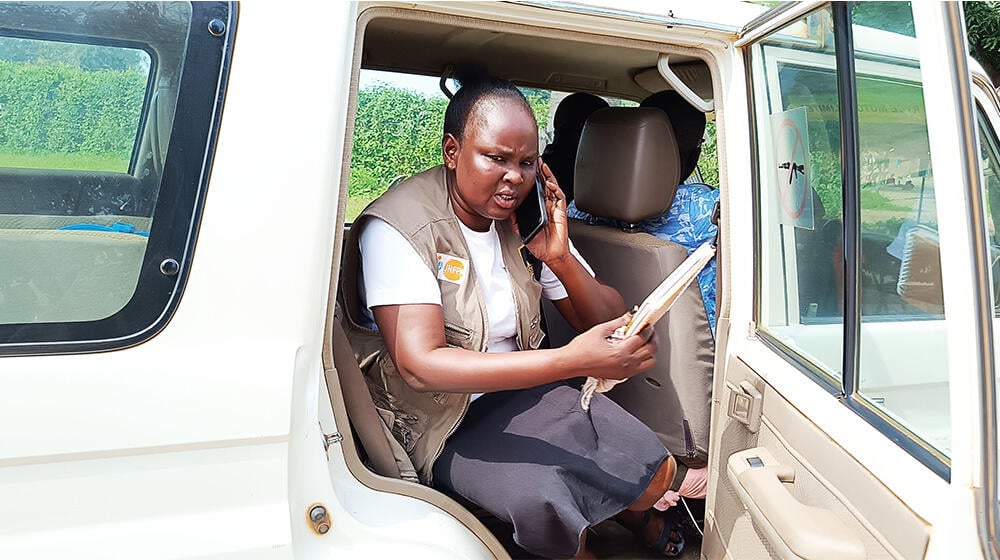Naome Athiang Mayor is 32 years old and is the face of the International Rescue Committee (IRC). IRC is a UNFPA implementing partner to end Gender-Based Violence in Rumbek, Lakes State. Naome works as a GBV Response Officer at the organization’s Family Protection Center. Her mobile phone doesn’t rest, it buzzes with calls 27/4, responding to cases and coordinating referrals to ensure ending GBV in far and wide the vast territory of Lakes State.
Naome says all the efforts she and her team are putting in don’t come on a silver platter. It is a game of hide and seek, and her life and that of the team are at risk, saying in most cases they end up being beaten and humiliated for nothing but the quest to protect women and girls in the hands of abusive partners and harmful traditional cultures.
She recalls a harrowing ordeal early last year when the IRC offices were besieged simply because they had three survivors under their protection. They were surrounded by the parents of the survivors demanding their release. In their custody were three young girls, whom they rescued following a phone call from the survivors. Sensing danger, she quickly called the Special Protection Unit (SPU) of the South Sudan National Police Unit in Lakes State. The police responded by sending armed police to go and disperse the irate relatives. “It was an unpleasant situation, but I am not going to surrender in my quest to help the women of South Sudan and see a South Sudan free of GBV. Our lives are in danger, but we shall pursue this course till the last minute. “she says.
Mid-October, while in a donors meeting, the visibly disturbed Naome ends up canceling the meeting as she responds to an emergency. This was a referral from as far as Cueibet, about 52 kilometers away from the capital Rumbek. This particular case was rape, she quickly dispatches the driver. “You see, this is how my day is punctuated, she says. I vividly recall how our vehicle was waylaid and put at gunpoint and a survivor was taken out. This occurred when we were on our way from picking up a survivor. When I questioned why they were taking the girl out, their response came with a threat, ‘Do you want to be dead or alive?’ Left with no option, we left the helpless girl, but still, we reported the matter to the Special Protection Unit-SPU and the State Ministry of Gender Child and Social Welfare” she reveals.
Threatened by gun-wielding GBV perpetrators thrice this year, she says the situation is tough and she doesn’t anticipate it getting any better, attributing it to consistent and sustained awareness. Naome says the community has woken up from sleep and is beginning to claim their rights, as they are becoming more aware of GBV services IRC with funding from UNFPA are offering.
She points out another harrowing situation when a young South Sudanese-Australian girl’s case came to OSC, who had refused a forced marriage when she visited South Sudan last year. The girl in question Rose Aluel (not her real name) was to be married off to an old man who was prepared to pay hundreds of cows, but Aluel stood her ground and refused the marriage. Naome narrates, ‘on hearing about me, she ran up to our office IRC and handed herself to me. Naome through her network made use of the GBV subcluster and IOM to coordinate Aluel’s rescue and subsequent departure from Rumbek.’ “All these negotiations did not come easy. The young men from the cattle camp were everywhere looking for me until my husband got frightened. He asked me to leave the GBV response job, but I stood my ground and said, NO one will support the women of South Sudan wherever they are. I will go and pick them to give them support. Their cry is my cry. if I don’t stand with them No one will.”
The soft-spoken Naome says her phone is like a call center. She receives calls until she goes to bed. Thanks to her supportive partner, she says women call on her and she then transfers the calls to the GBV hotline for Lakes State she says. ‘This is how my daily life goes, but am now used to it, it comes with challenges’, says Naome. “I conduct counseling on the phone. I refer cases on the phone. So I am used to it. I have no time, and because am committed to seeing a GBV-free South Sudan, because of the awareness on our toll-free hotline- 0922556262 women come forth to report. On a daily basis between three- to four women come to report GBV cases. Most of the clients who call are women and girls from different directions of Rumbek. Women come to thank us for having helped them out. When we get this heart-warming feedback, it gives me joy”. said Naome.
The South Sudan National Strategic Action Plan on elimination of Child Marriage (SNAP) aims to end childmarriage by 2030.
Last year, the Lake state legislative Assembly passed customary laws to enable it to aggressively tackle child and forced marriages in its jurisdiction. The State Governor, Gen. Rin Tueny Mabor distributed the by-law to traditional chiefs to ensure no girl-child is married off early and forcefully.
UNFPA and partners such as IRC among others are implementing programmes across South Sudan to end child marriage, key among which is the annual chief’s conference which normally convenes in Juba to deliberate and take stock of progress made so far towards ending child marriage by 2030.


